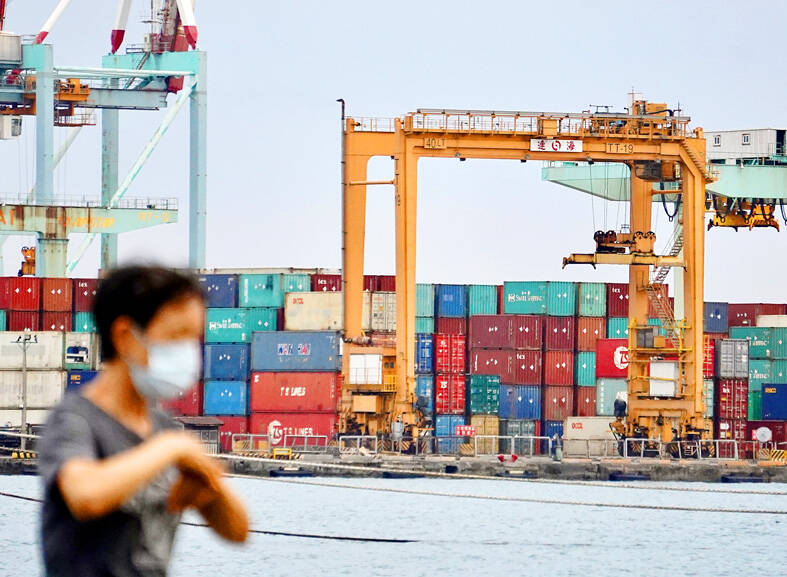The Directorate-General of Budget, Accounting and Statistics (DGBAS) yesterday trimmed its forecast for Taiwan’s GDP growth this year from 3.94 percent to 3.9 percent, saying it had previously overestimated the strength of exports.
The downward revision came after economic growth, which increased 6.63 percent in the first quarter, moderated to 5.06 percent in the second quarter.
“Despite the tweak, Taiwan’s economy remains on a course of stable growth that will extend into next year,” DGBAS Minister Chen Shu-tzu (陳淑姿) told a news conference in Taipei.

Photo: CNA
While demand for technology products remained strong on the back of the artificial intelligence boom, shipments of non-tech products weakened, resulting in an imbalanced recovery, Statistics Department head Tsai Yu-tai (蔡鈺泰) said.
Exports, the main component of the nation’s economy, are projected to expand 8.71 percent this year, down from the 10.06 percent the statistics agency predicted in May, after second-quarter results missed the target by 4.54 percentage points, the agency’s report showed.
China-bound exports in particular have taken a hit from China’s economic slowdown and the global electronics supply chain realignment, government data showed.
Manufacturers of plastic, chemical and petrochemical products were dealt an extra blow by cross-strait tensions and the termination of favorable trade terms.
Consequently, exports are forecast to increase 6.27 percent this quarter and 6.53 percent next quarter, down from the agency’s previous estimates of 7.02 percent and 6.73 percent respectively, Tsai said.
Suppliers of electronics used in AI development and applications posted robust earnings and are looking at continued improvement.
Taiwan Semiconductor Manufacturing Co (台積電) on Thursday said that it has signed an agreement with Innolux Corp (群創) to buy the display maker’s plant in Tainan for NT$17.14 billion (US$530.85 million) amid tight supply of its advanced packaging capacity.
That suggests private investment, another GDP component, would stage a faster rebound of 3.89 percent, up from 1.52 percent previously, which should help offset disappointing external demand, the DGBAS said.
At the same time, consumer spending would remain resilient, growing 2.78 percent this year, little changed from the previous forecast of 2.77 percent, it said.
Consumer prices are forecast to grow from 2.07 percent to 2.17 percent this year, as a spate of bad weather pushed up vegetable and fruit prices, it said.
The inflationary gauge is expected to return to the central bank’s 2 percent target next year at 1.91 percent, it said.
The DGBAS also reported that the nation’s median income last year climbed to NT$349,000. This raised the annual tax deduction for basic living expenses by NT$7,000 to NT$209,000, or an extra tax deduction of NT$28,000 from personal income taxes.
People may claim the benefit when they file income taxes in May next year for this year’s earnings.

Taiwan’s rapidly aging population is fueling a sharp increase in homes occupied solely by elderly people, a trend that is reshaping the nation’s housing market and social fabric, real-estate brokers said yesterday. About 850,000 residences were occupied by elderly people in the first quarter, including 655,000 that housed only one resident, the Ministry of the Interior said. The figures have nearly doubled from a decade earlier, Great Home Realty Co (大家房屋) said, as people aged 65 and older now make up 20.8 percent of the population. “The so-called silver tsunami represents more than just a demographic shift — it could fundamentally redefine the

The US government on Wednesday sanctioned more than two dozen companies in China, Turkey and the United Arab Emirates, including offshoots of a US chip firm, accusing the businesses of providing illicit support to Iran’s military or proxies. The US Department of Commerce included two subsidiaries of US-based chip distributor Arrow Electronics Inc (艾睿電子) on its so-called entity list published on the federal register for facilitating purchases by Iran’s proxies of US tech. Arrow spokesman John Hourigan said that the subsidiaries have been operating in full compliance with US export control regulations and his company is discussing with the US Bureau of

Businesses across the global semiconductor supply chain are bracing themselves for disruptions from an escalating trade war, after China imposed curbs on rare earth mineral exports and the US responded with additional tariffs and restrictions on software sales to the Asian nation. China’s restrictions, the most targeted move yet to limit supplies of rare earth materials, represent the first major attempt by Beijing to exercise long-arm jurisdiction over foreign companies to target the semiconductor industry, threatening to stall the chips powering the artificial intelligence (AI) boom. They prompted US President Donald Trump on Friday to announce that he would impose an additional

Pegatron Corp (和碩), a key assembler of Apple Inc’s iPhones, on Thursday reported a 12.3 percent year-on-year decline in revenue for last quarter to NT$257.86 billion (US$8.44 billion), but it expects revenue to improve in the second half on traditional holiday demand. The fourth quarter is usually the peak season for its communications products, a company official said on condition of anonymity. As Apple released its new iPhone 17 series early last month, sales in the communications segment rose sequentially last month, the official said. Shipments to Apple have been stable and in line with earlier expectations, they said. Pegatron shipped 2.4 million notebook